Get posts by email
Soap Making Supplies & Where to Find Them
October 19, 2011
This is an old post and some of the information is outdated. I keep an updated list of soap making suppliers, especially for Canadian soapers, at this page.
This is post two of a four part soapmaking series. Posts one, three and four are linked below:
When I first learned how to make soap over four years ago I was living in a Maine city. A small city compared to most but one of the largest urban centers in Maine, which isn't saying much. Everything I needed to make soap could be found in a few shelves at my local health food store.
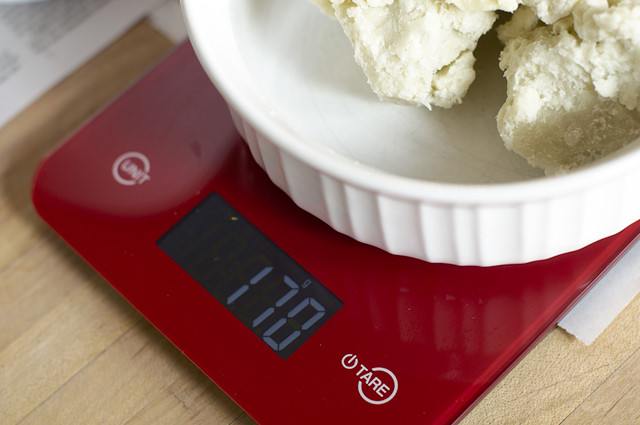
That health food store was teensy by Whole Foods Market standards but its shelves were packed with treasures. I had no idea how blessed I was.
For the first couple years I bought all my supplies at this tiny but well stocked store - carrier oils, lye and essential oils. Certain carrier oils were expensive and essential oils gave me sticker shock (even more so now with prices rising) but I built up my soap stash slowly and sold some bars to a few friends and family to put that money back into my soapmaking cash envelope.
This made it relatively easy to get started as a soapmaker. The supplies were readily available and I staged their purchase to make it more affordable.
The first year I made a big batch of soap it was for gifts. I can't remember now if it was hostess gifts for a trip back to Canada or Christmas gifts I was sending. I used our gift budget to help fund the soap supply purchase.
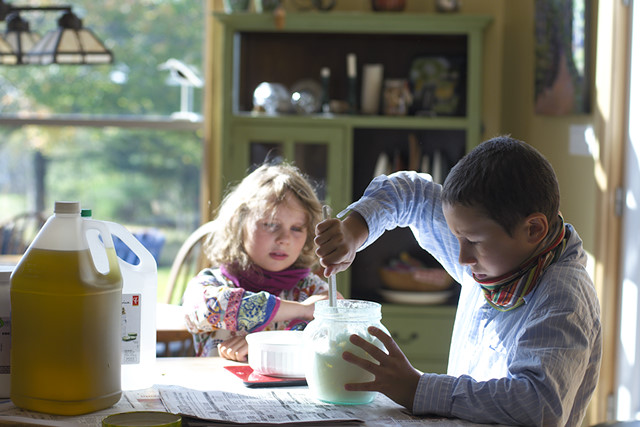
Fast forward to this winter.
In getting ready to move I didn't have time to make soap and I didn't replenish any oils I used after making lip balm, lotion or spa day with the girls.
When we moved I had enough carrier oils and essential oil remaining to make one large batch of soap, some lotion and lip balm. Then I needed to restock. I have been dreading this restock for months.
In Maine I knew my "suppliers". Yes, soapmaking is kind of like a drug. There was the local health food store and when I wanted to save money and buy bigger quantities I did online ordering.
Over the years I had done my research and had spreadsheets comparing all the different suppliers and their prices. When we moved this spring all of that information no longer did me any good. Shipping heavy oils from US companies to Canada is ridiculously expensive.
I lost my usual suppliers, I had depleted my supply, and there was no local source for essential oils and carrier oils (at a decent price) for making soap. And lye, the absolute must-have ingredient for soap making, where does a person find that?
I had to figure that all out this summer. And I'll be frank, spend a lot of money, to get set up again for soapmaking.
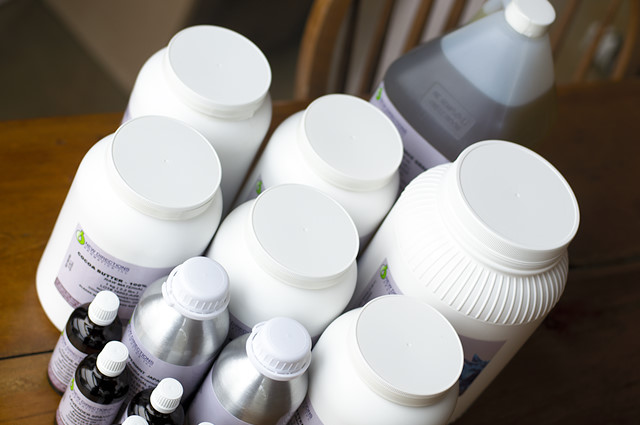
Where to Find Soap Supplies
I have published two very descriptive tutorials on soapmaking:
I am not going to repeat myself here and teach you how to make soap. See those posts for everything you need in that regard.
What I want to do is walk you through all the things you need to make soap and where you might find them. My soap making video shows you all the things you need so I recommend you watch that if you need clarification on anything I mention below.
1. Water
This can be as simple as using tap water, I usually do. But most people recommend using distilled. I recommend that also if you want to ensure your bar doesn't turn a funny color.
I learned from a fellow soapmaker and friend that if there are certain minerals in your water they can react with the lye to produce funny colors. Distilled water is cheap and readily available at the grocery store.
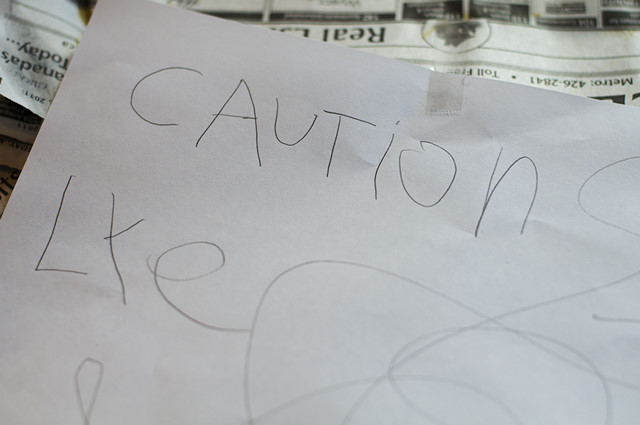
2. Lye
Ok, this is where it gets tricky. Lye can be hard to source locally. See the list of online suppliers on this page. Camden-Grey is a US company that sells lye and Saffire Blue is Canadian source.
In Maine I was able to find it locally at a health food store in the soapmakers section.
Since moving to Nova Scotia I've been able to find it locally at Home Hardware. This might be true all across Canada. In the United States I also found it at a small hardware store. Look with the drain cleaners.
You may have to do some serious snooping to find this ingredient but you simply cannot make cold process soap without it. Unless you want to try running water through your wood ashes, which is how lye used to be produced.
I'm thankful to buy mine in white pellet form.
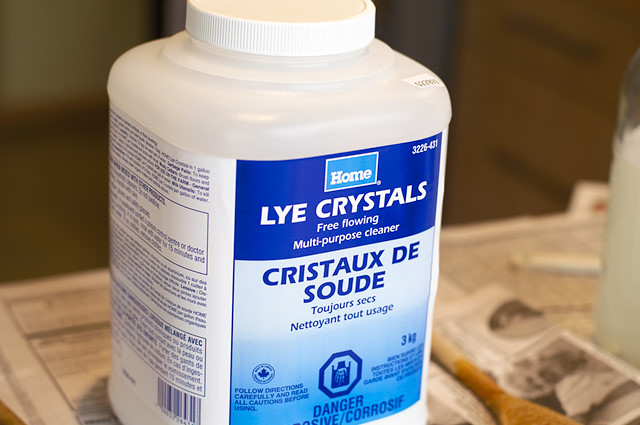
3. Carrier Oils
Carrier oils are the oils that you mix with the lye and water. This can be as simple as a 3 lb tub of Crisco you buy at the grocery store. In my next post I'll be sharing my journey as a soap maker, trying experimenting with different oils through the years.
If you want to get fancy (more skin and eco-friendly) the cost increases and finding oil can be harder.
You might luck out with a good store near you, if not you'll have to do on-line or mail order. This is what I had to do this summer. To make it worth my shipping costs I purchased enough to last me for at least one year of soapmaking and then some.
I ordered from the Canadian branch (they are also in the US, Australia and the UK) of New Directions Aromatics. Thank you Wooly Knits N Bits for the tip. It was very overwhelming to order from such a large supplier since there are so many grades of oils to choose from - refined, fair trade, natural, organic, etc...
I simply choose the cheapest varieties for my first order. It was expensive enough as it was.

4. Essential Oils
These are the totally optional ingredient in soap making. But they are the ones that give handmade soap its lovely fragrance. One of the reasons I make handmade soap is to have these scents in my life, in the quotidien mundane, and so I always add essential oils except to my Simple Soap which I use for cleaning. Though I could add a Tea Tree oil to that for an extra cleaning boost.
Here again, you may luck out with a store nearby you that sells some of the cheaper essential oils, like the NOW brand. I don't use the highest quality, aromatherapy grade essential oils in my soap. That would just be too expensive.
The best deal I've found for essential oils is to buy larger quantities at the same places you can find carrier oils.
While you are still learning and experimenting stick with the basic and inexpensive essential oils like lavender, peppermint or rosemary. These are still my three favorites to use. And are very versatile for other home and health purposes.
5. Tools & Hardware
The only special kitchen equipment you really need for making soap are a thermometer, scale and a hand blender. Everything else is stuff you find in an average kitchen - pots, glass measures, etc.
If you use wood utensils for stirring lye you should not use those same ones for cooking. I also wouldn't use plastic for both lye and cooking. Anything glass or stainless steel is safe for both uses.
See my video for exactly what you need. It's not much.
I want to add that special soap molds are totally not necessary. A cardboard box lined with a reused plastic bag works great.
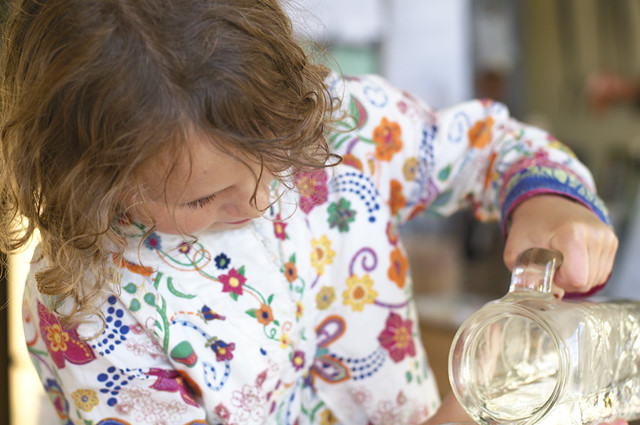
Affordable Soap Making
Making cold process soap is not a cheap hobby. Yes, you save money by not buying soap but unless you're switching from buying all handcrafted soap to making all your own, you won't save money.
Factory made soap at $1/bar (or whatever the price is) is still cheaper than a $5.00 bar of artisan soap. But of course handmade soap isn't all about cost. It's about the health of our skin, the environment, and the beauty we bring to our everyday when we use it.
The areas I've noticed saving money is using my Simple Soap for laundry, dishes and cleaning. Damien has very sensitive skin and I have certain environmental standards for what soap I use. The cost of store bought safe-for-sensitive-skin and environmentally friendly soaps is much more expensive than making it myself.
Handmade soap for our shower, hand and hair washing is another matter. It's those luscious oils I use to moisturize our skin and the essential oils that add the lovely fragrances that boost the cost.
Here's some ideas for making soap craft more affordable:
- Share the special kitchen supplies. A kitchen scale is a very handy tool. We use it all the time for weighing trail food and other kitchen uses. I'd own one anyway, even if I wasn't a soap maker. But if not having a scale is stoppping you from trying soap making - borrow one. Or pool resources with a friend and buy one to share. The same goes for a hand blender. I use one with a detachable blade. I own two blade attachments, one for soap, one for cooking. I started with using just one for both purposes, just clean it really well.
- Sell your soap. Even if you don't want to be an etsy or farmer's market retailer sell it to your friends and family. If all you want to do is cover your costs you can give them a deal and your soap will be cheaper than a soap maker wanting to actually earn money from their craft. Or maybe you'll mark it up (your time is worth something!) and add a few extra dollars to that soap fund.
- Have a soap buddy and order supplies together. If you can't find supplies locally you'll have to do on-line or mail order. These are usually bigger quanities (cheaper per unit though) and there are shipping costs also - oils are heavy. Find a friend who wants to make soap and split an order. It will make that initial purchase more affordable.
- Give soap as gifts. Most of us spend some amount of money on gifts during the year and the big gift giving season is coming up. Instead of buying gifts for your family and friends buy your supplies and give them soap for a holiday gift. This has funded many of my soap supply purchases.
I'm addicted to soap making and love using handmade soap on my skin. This summer before I managed to make a batch I bartered my photography with a local soapmaker so I could stock our bathroom with hand crafted soaps.
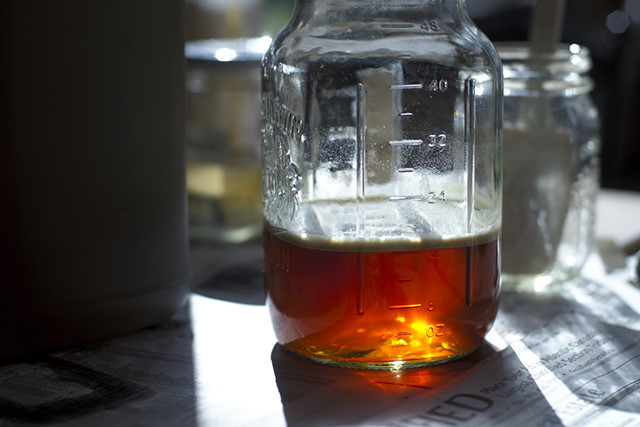
It's always been a process of figuring out how to make it work, from both a cost and time perspective.
On that note, I am pleased to announce I will be selling a limited number of bars of the soap I'm making this week - Lavender Lemonade Shampoo Bar and Christmas Spice. Or something like that, the name of my holiday bar is yet to be determined. It's like naming a child, you can't be sure on the name until you meet it.
These bars will be available for purchase December 1st. I will let you know when they are ready.
Any questions?
Filed Under
Resource Library
-

Amy on Oct. 19, 2011, 8:35 p.m.
I have never made cold process soap before, but I have made melt-and-pour soap using a glycerin base. I really enjoyed the process and the end result (and the lack of danger!). Is there a particular reason you have chosen to stick exclusively to the cold process method?
-

renee on Oct. 19, 2011, 10:39 p.m.
From my understanding, melt and pour soup is made from glycerin extracted from the cold process method. I like making a soap from the very basic ingredients, the old fashioned way. I'm attracted to the whole diy, pioneer/colonial/old times, radical homemaker element of it all. If that makes any sense.
-
-

Catherine Forest on Oct. 19, 2011, 11 p.m.
I have made my soap for years now and I now make shampoo bars that I love! It is great that you take the time to share all this so your readers might feel less intimidated and try it!
-

renee on Oct. 24, 2011, 11:21 a.m.
Catherine, Care to share your shampoo bar recipe?
-
-
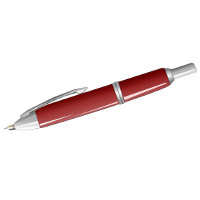
Pamela on Oct. 20, 2011, 12:35 a.m.
Hey Renee! I would love to purchase a shampoo bar if they are not all spoken for. My girls can't wait for me to make more lotion from your tutorial. They've decided that the essential combo I used made it smell like lollipops for some reason. Whatever - it's the only lotion they've ever liked!
Thanks, Pamela
-

Jennifer Brotherton on Oct. 20, 2011, 11:17 p.m.
What can I use instead of lye? I don't want to use that. Lye tears me up in delicate areas. :( So when I buy handmade soap, I have to be very careful and ask if it has lye in it first. Otherwise, I can't walk after using it. :( Learning to make soap has been on my to-do list for YEARS. Now we have goats, have bred them and will have goats milk next spring...we're going to get started making goats milk soap.
-

renee on Oct. 21, 2011, 12:17 a.m.
You can't make soap without lye, unless you do melt and pour. I found these articles that talk a bit about that:
Soap without Lye
No Lye No Soap
Wish I could help more. Maybe the handmade soap you've used wasn't cured properly?
-

Karen on May 11, 2015, 6:58 a.m.
Having made soap for many years, I can tell you that the reason for the burn usually has to do w/ not super fatting the soap (means increasing the oil content - usually by 5% to ensure no burns) and/or not checking ph levels. These two steps keep soap safe - I have several customers who have commented on the fact that my soap doesn't burn delicate areas. A lye calculator (brambleberry.com) is a wonderful help for making this correction to a soap recipe.
-
-
-

Elizabeth on Nov. 28, 2011, 12:05 a.m.
Please contact me! I am beginning my journey of soap making! I am gathering oils and I have questions about if you know how to make your own oils ? Fir instance rosemary oil, I was told form a friend that you could put some pieces of the sprigs from the rosemary plant, Ansley it sit for aboutsix weeks remove the sprigs and whola rosemary oil! Is this true do you know how to do the oils? Please contact neon my email. Thanks so much for sharing keep going back to your site! I love it you need to write a book! Sincerely Elizabeth.
-

renee on Nov. 28, 2011, 11:17 a.m.
You cannot make your own essential oils unless you have some sort of distillery. You CAN make herbal infused oils but adding plant matter to an oil, like olive oil and let it sit for weeks. But that will only yield an infused oil which is totally different from an essential oil. An example of a herbal infused oil is this post I wrote about making a sore muscle rub.
-
-

Andi Luther-Philippe on Jan. 19, 2012, 10:31 p.m.
Hi Renee! I found your blog incidentally by doing some type of search for soap suppliers. At any rate, I just wanted to say that your pictures on this article are great! So crisp! And your children (I assume?) are adorable.
-

renee on Jan. 20, 2012, 1:28 a.m.
Andi, Nice soap blog you have. Leaving a link below for readers. We Love Soap And yes, those are my kiddos. They are adorable, aren't they?
-
-

Lillie on Jan. 23, 2012, 12:24 a.m.
Hi Renee, thanks for your soap blog. My hubby and I have recently taken up the hobby of making our own cold pressed soap, as it's something we've thought of for years, and the cost of buying artisan/ home made soaps is getting to be too costly. We have just made three batches and are in the painful process of waiting for them to cure before we can try them out. Our first batches were: 1) Lemongrass, peppermint and tea tree oil. Smells like a spa 2) Russian earl grey tea (loose tea) with lemongrass essential oil 3) ground coffee and vanilla
They all look beautiful and so different. We are using a basic recipe with Coconut oil, caster oil, olive oil, lye and water. I have recently ordered some palm oil so that I can make a batch with Shea butter, as they seem to always be together in a recipe. I've purchased my stock of supplies from Canwax. They're prices were decent, the shipping was $20, so you want to make your purchase worth the shipping. I've recently discovered that Gallaways, a specialty food and organic shop in Burnaby carries many of the soap making products which is great, as I have a brother in Burnaby we visit a handful of times a year, and will plan to stock up there next trip, to avoid shipping costs, as we live in the Okananagan, I have not found any suppliers of soap ingredients locally.
Thanks for the information, I will definitely be following your blog. Lillie
-

renee on Jan. 23, 2012, 12:44 a.m.
Thank you for this Lillie. Love to find new soap suppliers.
-
-

Anonymous on Feb. 4, 2012, 7:26 p.m.
Thank you so much for such an informative site. I am so pleased to be able to try making soap next week. My son is coming down and he makes his own soap also. He raises cattle and uses their fat. Very basic soap, but real good. Then will delightfully start experimenting with different essential oils etc..
Thanks again.
-

Goat Lady on Nov. 20, 2012, 2:29 p.m.
In remote Nothern New Brunswick we couldn't find lye anywhere until we read your page and wow, there it is in Home Hardware, right under our noses. Perfect, thank you so much for posting. We have a small goat rescue farm and want to try using the extra milk to make soap with.
-

renee on Nov. 20, 2012, 2:31 p.m.
That's awesome! I'm happy you've found it. Lye is the hardest soap ingredient to come by. By the way, I live in remote Gaspe Peninsula, pretty close to you if you're in Northern NB.
-
-

Brenda on Nov. 5, 2013, 11:57 p.m.
Love the info. I'm planing to start making soap. Presently gathering the supplies,and watching videos.
-

Amanda on March 27, 2015, 2:37 a.m.
I'm just venturing into selling hand crafted body care products after a successful holiday season selling goodie baskets to friends who didn't have the time to DIY. Do you know of any by-laws that prevent the sale of home made soap in NS?
Thanks,
Soap Newb
-

renee on March 28, 2015, 3:47 p.m.
Dear Soap Newb in Nova Scotia,
I don't know anything about the sale of homemade soap in NS.
-
-

Jeneen on May 16, 2018, 10:28 a.m.
Hello, I came across your blog when I was looking for different soaping suppliers. I love your blog and that your kids join in on the soap making with you.
I have been soaping for over a year and I can't get enough of it. I do not have any questions I just wanted to say tell you keep up the great work and I will be following. Also I hike the upper 46 Adirondack Mountains. They are 3 hours from my house and it is another love of mine.
Jeneen
-

Renee on May 18, 2018, 12:06 p.m.
Hi Jeneen,
Thanks for commenting on this old post. I'd love to have you follow my writing but unfortunately (for the soapmaking crowd) I don't write many soapmaking posts these days. My family and I now live in Montreal, 2 hours from the Adirondacks. I love the Adirondacks and had no idea how challenging those mountains were. It's a great hiking spot.
Thanks for visiting. All the best in your soapmaking and hiking adventures!
-
-

Denise Runyon on Oct. 20, 2018, 5:46 a.m.
Hi Renee, I’m new to the NB area from WV. I have always used Brambleberry products, which I love, but now find it difficult to find a one stop shop supplier on the east coast. Are they only in ON and BC? Seems strange, or am I missing them? Any help would be appreciated, I’m dying not being make my soaps due to expensive shipping costs from US, not to mention expensive products from ON. Thanks, Denise
-

Renee on Oct. 21, 2018, 2:27 p.m.
Denise, I feel your pain.
In 2011 my family moved from Maine back to Canada, where we are originally from. This post was published shortly after our move. It takes some time to adjust to Canadian shipping prices and the reduced options available in the Canadian market. I still haven't completely adjusted to it. I still miss US prices.
Unfortunately, I don't have a great option to recommend you.
I live in Montreal now and buy a lot locally but I have a list of suppliers on this page of my blog, which might help you.
-
-

Marise on Jan. 25, 2019, 1:39 p.m.
Hi Renee,
If you live in Montreal go to CoCo Coop or order online for your supplies, I used Safire blue before and had very bad experience with them, I will only use CoCo Coop now
-

Renee on Jan. 25, 2019, 3 p.m.
Yes, that's where I buy things locally. CoCo Coop is a great place to shop! Thanks for sharing your experience.
-
You can subscribe to comments on this article using this form.
If you have already commented on this article, you do not need to do this, as you were automatically subscribed.






Jennifer @ kidoing! on Oct. 19, 2011, 8:27 p.m.
Renee - just popping in to say that I absolutely love all these posts on soapmaking. I am not there, yet, but I hope to make soap someday soon. I will be making a body scrub with a friend in the coming weeks and excited about that! Thanks for all this wonderful info.